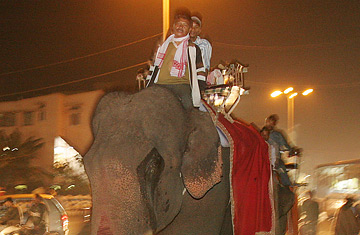
Elephants head for a wedding procession through a busy street in India.
Traffic has come to a halt on a tight slip road in the congested Lajpat Nagar area in the southern part of India's capital, but drivers are resignedly restraining their impatience. That's because the obstacle holding up the traffic is a wedding procession, and to protest would be rude. At the head of the procession, the groom, dressed in glittering brocade and sporting a ceremonial sword, nervously tries to mount a white mare. He succeeds on the third attempt, much to his own relief and to cheers from his entourage. A band begins to play Bollywood hits and everyone breaks into a dance. Soon, the procession is on its way, led by the groom on his spotless white mare, resplendent in her gold-embroidered red attire.
A white mare being the traditional conduit for the groom in Hindu and Sikh weddings in northern India, those who make such steeds available for rental have experienced a business boom thanks to Indians' increasing penchant for ostentatious weddings. Wedding planners in Delhi report that the cost of hiring mares has risen at least twofold over the past five years, and more people are opting for the even more elaborate two- or four-mare carriages. Since at any given time there are only 500 or so white mares stabled in and around Delhi, rental prices can rise tenfold or even more during the wedding season, which runs from October to February. "Normally, hiring a mare for a day should cost 500 rupees ($12)," says Ashok Ahuja of Sohan Lal and Sons, a firm specializing in accoutrements for wedding processions, "But during the wedding season, it costs 5,100 rupees ($130)." A carriage, accompanied by a live band, lighting and decorations can cost up to 100,000 rupees ($2,500), he says, which doesn't seem to deter families eager to splurge on style statements.
The custom of grooms arriving on horseback dates to the 12th century, when Prithviraj Chauhan, a Rajput ruler of north India, eloped on horseback with his lover Sanyogita, daughter of a rival ruler. It has since become a time-honored tradition for north Indian grooms to whisk away their brides on a shining white mare — mare, not horse, as a mare is considered auspicious, although it is an open secret that the mare is often substituted by a castrated horse. But for those looking to flaunt their wealth, a mare just doesn't cut it when there's an elephant to be had. "Elephants look more regal," says Ashok Kumar from Harjai's India Wedding Planners, and if he is to be believed, many an Indian groom wants to feel like a prince on his wedding day. An elephant can cost upwards of 20,000 rupees ($500) during the wedding season, up from about 2000 ($50) during the rest of the year.
Meanwhile, parents planning to hire horses and elephants for their children's birthday parties — another growing trend — find themselves having to cough up similar prices. "We really wanted an elephant for our son's birthday," says Gul Mukhey, a business development professional based in Delhi. "But the owner said the price on that particular day would be 21,000 rupees ($525) as we were in a long queue!" But mare and elephant owners counter criticism of their prices by pointing out that it costs a lot to maintain their animals, and since they mostly get work during the wedding season — for most of the year, their work is restricted to religious processions or children's parties, which pay a lot less — it is only fair to demand a good price when demand is high. Elephant owner Iqbal, who supplies horses to Sohan Lal and Sons, argues that well-paid owners treat their animals better, and animal rights NGO Society for Prevention of Cruelty to Animals confirms that complaints of ill-treatment of horses and elephants have become very rare. But it's not just simple economics, says Ashok Kumar of Harjai's, "We're dream merchants, and no price is too high for a dream."
